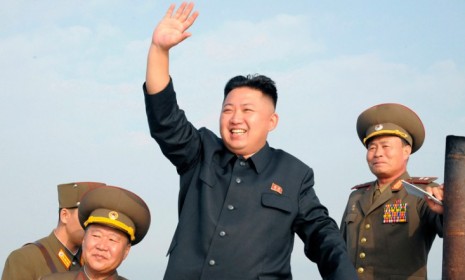Is North Korea finally embracing capitalist reforms?
The Hermit Kingdom is reportedly taking tentative steps to at least ease the central government's stranglehold over the economy

A free daily email with the biggest news stories of the day – and the best features from TheWeek.com
You are now subscribed
Your newsletter sign-up was successful
This week, Reuters and The Associated Press reported that North Korea is introducing modest measures to reform the country's collectivist economy. The regime will reportedly allow farmers to keep their surplus crops to sell or barter, and while that may sound like small potatoes, it would represent the most significant economic reform that supreme leader Kim Jong Un has made since coming to power some nine months ago. Indeed, it is precisely the type of agricultural reform that communist China embarked upon in the late 1970s, ushering in a period of liberalization that eventually turned China into an economic powerhouse. Here, a guide to the latest developments in the Hermit Kingdom:
How would the reforms work exactly?
"The proposed directive appears aimed at boosting productivity at collective farms that have struggled for decades to provide for the country's 24 million people," says Jean H. Lee at The Associated Press. Previously, farmers were required to turn over their surplus to the state, squelching any incentive to grow more food, and driving up prices. Under the reforms, some farmers may keep up to 50 percent of their crop, says Benjamin Kang Lim at Reuters. That could transform one of North Korea's biggest economic sectors, and also address chronic health problems in a country where one-third of the children are malnourished.
The Week
Escape your echo chamber. Get the facts behind the news, plus analysis from multiple perspectives.

Sign up for The Week's Free Newsletters
From our morning news briefing to a weekly Good News Newsletter, get the best of The Week delivered directly to your inbox.
From our morning news briefing to a weekly Good News Newsletter, get the best of The Week delivered directly to your inbox.
Why now?
The regime may view a shift to a market-based economy as essential to its long-term survival. "Selling cheap running shoes and stuffed toys to the world market will be significantly more profitable and less risky than selling plutonium and nuclear technology to rogue states," says Andrei Lankov at Korea Times.
Is Kim serious about reform?
Maybe. Since coming to power, Kim has "sought to project an image as a youthful leader who is accessible to his people," says Choe Sang-Hun at The New York Times. The sunny public-relations campaign has fueled hopes that Kim is serious about reform after decades of stagnation under the Stalinist regime of his father, Kim Jong Il. However, any reform agenda would likely meet resistance from "powerful entrenched military and party leaders opposed to sweeping change," says Donald Kirk at The Christian Science Monitor. It's unclear whether the younger Kim has enough power to significantly "reverse the pattern" of the last couple of decades.
A free daily email with the biggest news stories of the day – and the best features from TheWeek.com
Has the government endorsed the reforms?
Not publicly. This week, the country's Supreme People's Assembly, a rubber-stamp parliament, convened without mentioning economic reforms at all. However, the government "may announce reforms piecemeal to avoid creating controversy," says Kirk. "Change, when it comes, is likely to be a surprise — revealed perhaps by appointments and dismissals of key figures."
Sources: The Associated Press, The Christian Science Monitor, Korea Times, The New York Times, NPR, Reuters
-
 Political cartoons for February 21
Political cartoons for February 21Cartoons Saturday’s political cartoons include consequences, secrets, and more
-
 Crisis in Cuba: a ‘golden opportunity’ for Washington?
Crisis in Cuba: a ‘golden opportunity’ for Washington?Talking Point The Trump administration is applying the pressure, and with Latin America swinging to the right, Havana is becoming more ‘politically isolated’
-
 5 thoroughly redacted cartoons about Pam Bondi protecting predators
5 thoroughly redacted cartoons about Pam Bondi protecting predatorsCartoons Artists take on the real victim, types of protection, and more